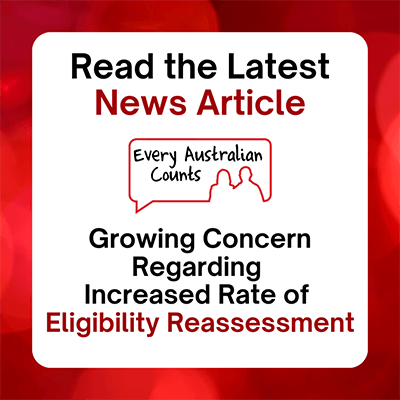Growing Concern Regarding Increased Rate of Eligibility Reassessment

Written by Muriel Cummins, for Every Australian Counts.
Last week, at a Parliamentary Hearing [1], the National Disability Insurance Agency (NDIA) revealed that they are currently completing very significant numbers of NDIS participant ‘eligibility reassessments’. During the hearing, the NDIA confirmed that have increased their staff team focused on this work, and are completing, on average, over 1200 eligibility reassessments weekly. Of these, 48% are having their NDIS access revoked i.e. approximately 600 participants each week. 80% of those receiving eligibility reassessment letters, are the early childhood group, children aged 5-9. The remaining 20% are from other groups of participants, across a range of disabilities. Over the weekend, media reported further details on the eligibility reassessment process [2].
What are the eligibility reassessments?
NDIS guidelines, updated in October 2024, say that NDIS will review your eligibility if their evidence indicates you may no longer meet eligibility criteria. The NDIS do this by reviewing the evidence they have in their system for your disability, and residency requirements [3]. It is not a new assessment as such, more like a desk-top audit of the evidence they have on file. If they have concerns that you do not meet the eligibility criteria, they are sending letters to tell you that you are undergoing eligibility reassessment. The letters are listing the evidence that NDIS already have on their file and giving participants 28 days’ notice to provide additional evidence.
Why are rising rates of eligibility reassessment, concerning?
We are hearing that, from the heart-stopping moment a participant or family receive these letters, the eligibility reassessment process is enormously stressful.
We are hearing that the 28-day timeframe to provide additional evidence is too short. It is not enough time to get an appointment to see a therapist or specialist, let alone obtain a written report focused on eligibility requirements. The tight timeframe creates a sense of stress and pressure. Some participants have told us that they simply did not read the letter in time, to even begin to source additional evidence. The recent NDIS legislation indicates the NDIA CEO may give participants 90 days to provide additional evidence prior to deciding to revoke a participant’s NDIS access [4].
The eligibility reassessment letters we have seen, are not providing the specifics of the information needed by NDIS to confirm eligibility. The letters list the generic eligibility criteria. This makes it very difficult for the participant to understand what evidence is needed, and who to approach to source the right evidence. This is particularly confusing when the eligibility reassessment letter lists numerous existing evidence reports already included on the participants NDIS file.
Significant numbers of children, and others, are having access to the NDIS revoked [1]. While there is an early-stage consultation on building supports outside the NDIS, called foundational supports [5], these supports are not in place, and are months or even years away. Children exiting the Scheme do not have alternative supports in place once they lose access to the NDIS.
Many participants, understandably, hope that NDIS to provide certainty of essential disability support for their lifetime, as they have proven permanence of disability to gain access to the Scheme. We are hearing from people who are genuinely shocked to receive eligibility reassessment notifications, particularly when the nature of the disability is proven permanent or progressive. Some examples brought to our attention include a young person with a progressive neurological condition who utilises powered mobility to access the community; a teen living with both autism and intellectual disability; and an adult in their early 60’s living with motor neuron disease.
What should I do if I receive an eligibility reassessment letter?
We understand this can be a stressful process. Seek support where you can, such as from a disability advocate, or by bringing your trusted providers together to brainstorm how to work together to respond to the eligibility reassessment letter.
Double check that the details contained in the letter you receive, are correct, and that all the evidence you sent to the NDIS, is listed within the letter. If they are not, then contact NDIS immediately and send them any additional evidence you have at hand.
If you approach a therapist or specialist and they give you an appointment date outside of the 28-day window, send this to the NDIS and request an extension on the 28-day timeframe to enable you to provide the additional evidence. The response to this request will be at the discretion of the NDIS CEO.
What is Every Australian Counts doing?
We are raising this issue with senior decision makers in the NDIA and we collecting examples about your experiences of the NDIS since the legislation changed on October 3rd, including experiences of eligibility reassessment. Please continue to share them with us, through our survey [6]. We will absolutely advocate for procedural fairness and an equitable NDIS, through the avenues available to us. Every Australian Counts exists to make sure the NDIS is delivered as promised and is the best it can be.
Some readers may find these numbers helpful:
Lifeline 131114
Suicide Callback Service 1300 659 467
Blue Knot Foundation (02) 8920 3611
Embed links
- https://www.youtube.com/watch?v=EIJXOozLMHQ (approx 30mins in)
- Exclusive: NDIS crackdown wrongly withdraws support | The Saturday Paper
- What happens if we check your NDIS eligibility? | NDIS
- NATIONAL DISABILITY INSURANCE SCHEME ACT 2013 – SECT 30 Revocation of participant status
- Consultation on Foundational Supports for Australians with disability | Department of Social Services Ministers
- NDIS Legislation Changes: Community Feedback Survey

Join the conversation